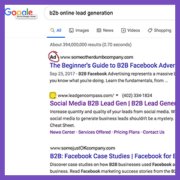Subject: Google, Google, Google. . . Christensen – Sales Lead Digest
This week we’re all about the Alphabet, baby. Their main revenue driver is still Google Ads and this week we have a lot of stories about them. It’s no secret that we at LeadGen Compass use Google’s products for lead generation every day. Most of our customers use their products and there is no easier set of tools for testing ideas. This week we’ll learn about Google’s changing search results page, Google’s upcoming Chrome browser changes, hear from Google Ads’ product chief, and end with a memorial to one of our favorite big thinkers, Clayton Christensen. Enjoy!
Google’s ads just look like search results now
“According to one digital marketing agency, click-through rates have already increased for some search ads on desktop, and mobile click-through rates for some of its clients increased last year from 17 to 18 percent after similar changes to Google’s mobile search layout.”
If you use Google search marketing, you’ve noticed this change which blurs the lines between sponsored posts and organic traffic. If you’re an SEO you’ve been explaining this to clients for a year. Google is in the advertising business but it needs to keep users happy with the service to continue serving 3.8MM search results a minute. If you’re marketing your brand on Google without tracking a blended cost per impression/click/lead over organic and paid, it’s time to start. READ MORE
As Google Chrome crumbles the third-party cookie, what’s next for adtech?
“For 25 years, third-party browser cookies have tracked the journeys of internet users. These maligned lines of code are unlikely to celebrate a 30th anniversary, however, with Google revealing plans to block them across its Chrome browser by 2022.
Given Chrome’s mammoth 66% monopoly on the browser market, the move has raised big questions about the future of cross-site tracking, retargeting and ad-serving for the adtech industry.”
On one hand Google makes changes to serve more ads, but the next story suggests they are improving the customer experience by eliminating cookie tracking in their browser. One thing we’ve learned for sure since using for almost 20 years, they are primarily in the ad selling business and make our customer’s lives easier in order to serve more ads. Regardless of how we feel about them, if our customers are there we should be there too and with this move using Google is almost mandated. READ MORE
Three Marketing Mistakes B2B Firms Made In The Past Decade
“What else are you focusing on?
Leaning more into automation. In apps, I was a champion for automation and making sure that automation is being evaluated as a potential solution for customer problems in all feature development and all product approaches. I often ask the question, ‘Have you evaluated automation as part of the solution, if not the solution?'”
To continue with the theme of this week’s news is an interview with Google Ads product manager. The engineers want to use the machines to make the customer’s lives easier, and to make advertiser’s lives easier too, by using automation. It’s useful to remember these tools are geared toward ad spends in the millions. The user spending $12,000 a year on Google needs a little more control. Especially in something like complex B2B sales where decisions are made over long periods of time by multiple people. READ MORE






